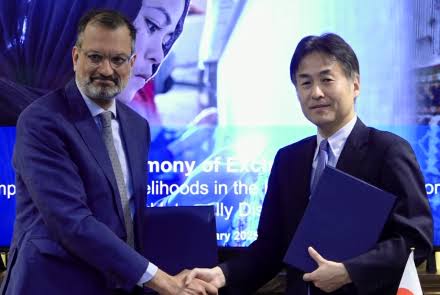The United Nations High Commissioner for Refugees (UNHCR) and Japan have signed a $6 million cooperation agreement to support displaced Afghans. The initiative will focus on providing sustainable livelihoods and boosting self-sufficiency for Afghan returnees. More than 15,000 people across thirteen provinces will benefit from this partnership.
UNHCR Representative Arafat Jamal emphasized the importance of this project. He stated that the initiative aims to improve self-reliance and prosperity for displaced individuals, returnees, and host communities. The agreement marks a significant step in addressing the challenges of Afghanistan’s growing returnee population.
Massive Return of Afghans Poses Challenges
Jamal highlighted the ongoing return of millions of Afghans to their home country. He revealed that more than two million people returned to Afghanistan in 2024 alone. He stressed that how this process is managed will determine whether Afghanistan moves toward stability or chaos.
Experts believe that the reintegration of returnees requires immediate support. Without proper infrastructure and economic opportunities, many face hardships upon their return. The UNHCR-Japan agreement aims to create programs that help returnees rebuild their lives.
Japan’s Commitment to Afghanistan
Japan’s ambassador to Afghanistan, Takayoshi Kuromiya, reaffirmed his country’s dedication to supporting the Afghan people. He stated that Japan will continue to invest in projects that promote sustainable development. These include initiatives in agriculture and community-based infrastructure. He also emphasized that the projects will ensure inclusivity and create opportunities for women.
Japan has consistently supported Afghanistan through humanitarian aid and development programs. Since 2021, Japan has contributed nearly $30 million to UNHCR’s operations in Afghanistan. This latest agreement strengthens Japan’s long-term commitment to the country’s stability.
Supporting Livelihoods for a Better Future
The new initiative will introduce projects aimed at improving economic opportunities for displaced Afghans. It will focus on providing vocational training, enhancing agricultural productivity, and developing community infrastructure. These efforts will help returnees and host communities build stable and self-sufficient lives.
UNHCR and Japan plan to work closely with local organizations to ensure the success of these projects. By prioritizing economic independence, the initiative seeks to reduce dependency on humanitarian aid. The program also aligns with broader international efforts to support Afghanistan’s recovery.
A Critical Time for Action
Afghanistan faces one of the largest displacement crises in the world. Millions of Afghans have been forced to leave their homes due to conflict, economic instability, and political changes. The recent mass return of refugees adds further pressure on an already fragile system.
UNHCR and Japan’s agreement comes at a crucial time. With ongoing challenges, international cooperation remains essential. The success of these projects could shape Afghanistan’s future and determine whether returning Afghans can rebuild their lives in a peaceful and stable environment.
Related Stories:
Afghanistan’s Taliban Makes Debut Diplomatic Trip To Japan
















